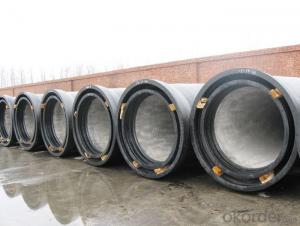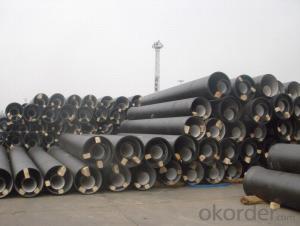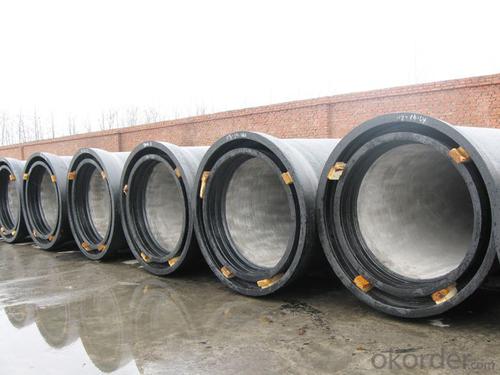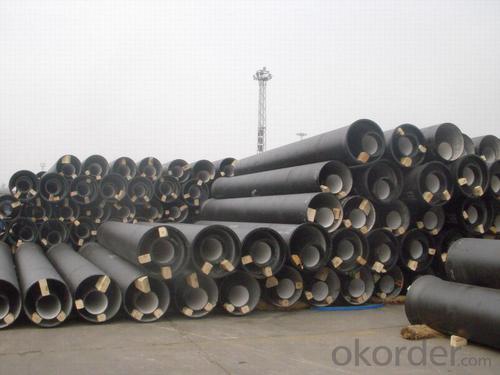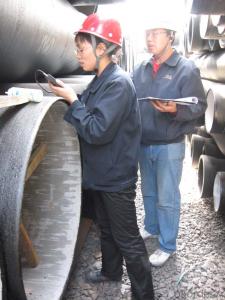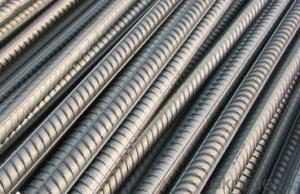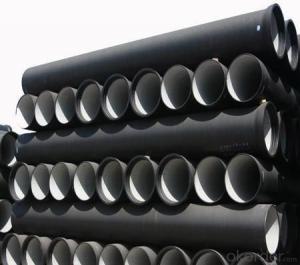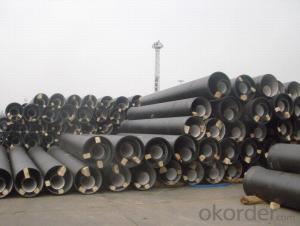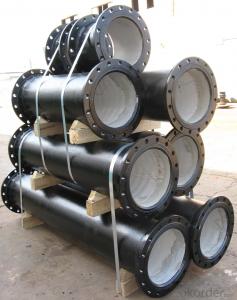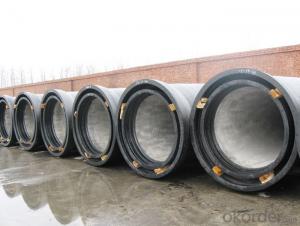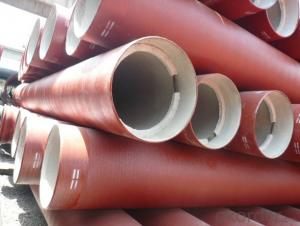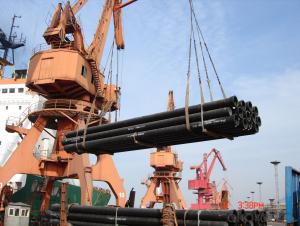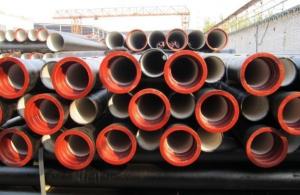Ductile Iron Pipe ISO2531 / EN545 / EN598 C Class
- Loading Port:
- China main port
- Payment Terms:
- TT or LC
- Min Order Qty:
- 20 m.t.
- Supply Capability:
- 200000 m.t./month
OKorder Service Pledge
OKorder Financial Service
You Might Also Like
1.Ductile Iron Pipe Description :
1) Pipes confirm to ISO2531,K9 class,T type joint,6m long,with inside cements lining conform to ISO4179, outside Zinc
spraying(130g/m2) and bitumen coating(70μm) conform to ISO8179.
2) Pipe ends: Spigot and socket ends, with 100% SBR rubber gaskets accoding to ISO4633
3) we can do third party inspection according to customer's request.
2.Main Features of the Ductile Iron Pipe:
1).Quality guarantee
• Chemical checking
• NDE after rough machining
• Mechanical testing after heat treatment
• Final NDE,dimension inspected
2).Quality document
• Full Q.A document as per client request
3).Packing and Shipping
• standard export package(carton/wooden case/pallet)
• accept FOB,FAS,CNF,CIF door to door etc or customer designated shipping agent
4)Inspection
• In-house Foundry
• Third party inspection available upon requirement
3.Ductile Iron Pipe Images:
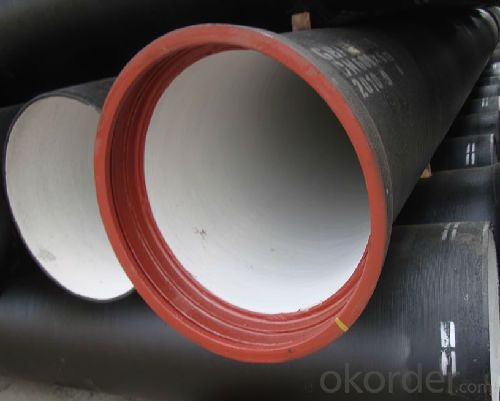
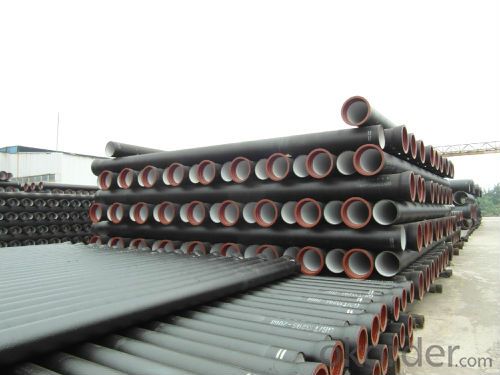
4.Ductile Iron Pipe Specification:
End Finishes: Beveled, Square Cut, Threaded, hat
Additional Services: Internal Coating
Packaging: packed in bag, plastic bag, steel strip, steel wire,double wire, iron box, wooden box, tarpaulin, plastic
sheeting
Test: X-ray, UT, magnetic particle,inspection,hydrostatic test.
Processing service: Beveling, Threading, Slotting, Cut-to length, Bends, Quench and Temper, Fabrication, Double-jointing
and On-site assistance
Documentary: MTC, material certification,Origin certification, CI or PI,Test Report, export licence, handling order,B/L,insurance policy,shipping instructions, contract, packing list etc.
5.FAQ:
We have organized several common questions for our clients,may help you sincerely:
1.Q: Why would you choose ductile iron pipe rather than other pipe materials?
A:The reasons are obvious for that not only ductile iron pipe possesses the inherent strength and flexibility of ductile
iron, combined with proven corrosion protection systems, but also the cost savings can be achieved from design to
installation and commissioning.
2.Q:Why can you guarantee the inner of pipes can’t be corroded?
A: High alumina cement mortar lining and sulphate-resistant cement mortar lining. These two special linings are applicable
to inner anti-corrosion for sewage pipes, improving resistance to erosion of the sewage components.
- Q: It's not easy to drill ductile iron with cobalt high speed steel bit. Please help to point it out
- Determine the authentic M35 cobalt bit, which is about 65HRC in hardness. General workpiece hardness of about 45HRC or less of the problem.
- Q: What are the different types of ductile iron pipe joints?
- There are several different types of ductile iron pipe joints commonly used in various applications. These joints are designed to provide a strong and reliable connection between pipes, ensuring efficient fluid transfer and preventing leaks. Some of the most common types of ductile iron pipe joints include: 1. Push-on Joint: This type of joint is easy to install, as it does not require any special tools or equipment. The spigot end of one pipe is inserted into the bell end of another pipe, creating a tight seal. A rubber gasket is usually used to enhance the joint's resistance to leaks. 2. Mechanical Joint: Mechanical joints are commonly used in water and wastewater applications. They consist of a gland, a rubber gasket, and a follower gland. The pipe ends are pushed into the gland, and the follower gland is tightened, compressing the rubber gasket and creating a secure connection. 3. Restrained Joint: Restrained joints are specifically designed to withstand high internal and external forces such as water pressure or soil loadings. These joints typically use a rubber gasket and a restraining mechanism, such as a bolt or wedge, to prevent the pipe from moving or separating under stress. 4. Flanged Joint: Flanged joints are commonly used in large diameter pipes or applications requiring frequent disassembly. Each pipe end is equipped with a flange, which is then bolted together with the use of gaskets to create a strong connection. Flanged joints provide easy access for maintenance or repairs. 5. Welded Joint: Welded joints involve heating the pipe ends and fusing them together to form a permanent connection. This type of joint is commonly used in high-pressure applications where a reliable and leak-free connection is crucial. Welded joints require skilled labor and specialized equipment. It is important to choose the appropriate type of joint based on the specific application, pipe size, and operating conditions to ensure the integrity and longevity of the ductile iron pipe system. Consulting with a professional engineer or pipe manufacturer can help determine the most suitable joint for a particular project.
- Q: Ductile iron pipe in the direction of it?
- The utility model is mainly used for conveying water, and is an ideal choice for tap water pipes.
- Q: Are ductile iron pipes resistant to impact damage?
- Yes, ductile iron pipes are highly resistant to impact damage due to their inherent strength and durability.
- Q: Are ductile iron pipes resistant to seismic events?
- Generally, ductile iron pipes exhibit resistance to seismic events. Ductile iron, a form of cast iron known for its strength and durability, can withstand external forces, including those induced by seismic events like earthquakes. The design of ductile iron pipes allows for flexibility, enabling them to absorb and dissipate energy from seismic waves. This flexibility ensures the pipes remain intact despite ground movements and vibrations, preventing any breakage or cracking. Moreover, the joints of these pipes are designed to offer some level of flexibility, further enhancing their ability to withstand seismic events. Furthermore, the construction of ductile iron pipes involves thick walls, providing them with exceptional structural integrity. This strength reduces their susceptibility to damage during seismic events and ensures a consistent flow of fluids, such as water, even in extreme conditions. Nonetheless, it is crucial to recognize that the resistance of ductile iron pipes to seismic events can depend on various factors. These factors include the magnitude and proximity of the earthquake, the quality of installation and maintenance, and the specific design considerations for the pipeline system. Consequently, it is vital to adhere to proper engineering and construction practices to optimize the resilience of ductile iron pipes in areas prone to seismic activity.
- Q: Are ductile iron pipes resistant to chemicals?
- Yes, ductile iron pipes are highly resistant to a wide range of chemicals, making them suitable for various applications involving corrosive substances.
- Q: Are ductile iron pipes suitable for irrigation canal systems?
- Yes, ductile iron pipes are suitable for irrigation canal systems. Ductile iron pipes are known for their high strength and durability, making them ideal for withstanding the pressure and load requirements of irrigation canal systems. They have a high resistance to external loads, such as heavy machinery, and can handle the stress caused by soil movement and settlement. Additionally, ductile iron pipes are highly resistant to corrosion and provide a smooth inner surface, which minimizes friction and ensures efficient water flow. This is crucial for irrigation systems as it allows for the effective distribution of water to crops, ensuring optimal growth and yield. Ductile iron pipes also have a long service life, typically exceeding 100 years, which makes them a cost-effective option for irrigation canal systems. Their low maintenance requirements further contribute to their suitability for this application. Overall, ductile iron pipes offer the necessary strength, durability, corrosion resistance, and efficiency required for irrigation canal systems, making them a suitable choice for this purpose.
- Q: How does ductile iron pipe perform in areas with high water hammer?
- Areas with high water hammer are well-suited for the use of ductile iron pipe, as it exhibits exceptional performance in these conditions. The robustness and durability of ductile iron enable it to withstand the forceful impact of water hammer without experiencing significant damage. Water hammer is characterized by a sudden surge in pressure resulting from the rapid alteration of water flow direction or velocity, often occurring when valves are swiftly closed. This abrupt pressure change places substantial stress on pipes, potentially leading to ruptures or failures. Nevertheless, ductile iron pipes possess outstanding resistance to such impact due to their unique composition and manufacturing processes. These pipes are comprised of a blend of iron, carbon, and small quantities of other elements like silicon and magnesium. The formation of graphite nodules during manufacturing grants ductile iron its exceptional strength and flexibility, rendering it less prone to cracking or breaking under pressure. In environments where water hammer is prevalent, ductile iron pipe's inherent strength and resilience allow it to absorb and dissipate the force generated by water hammer events. Its capacity to endure sudden pressure changes aids in preventing pipe failures, thereby minimizing the risk of leaks or bursts. Furthermore, the smooth inner surface of ductile iron pipes reduces the likelihood of water hammer incidents by minimizing turbulence and maintaining a steady flow. This particular attribute assists in mitigating the impact of water hammer on the pipe system. Overall, ductile iron pipe emerges as an ideal choice for areas prone to high water hammer due to its exceptional strength, impact resistance, and ability to withstand abrupt pressure changes. Its performance under such conditions ensures the longevity and dependability of water distribution systems.
- Q: Can ductile iron pipe be used for wastewater treatment plant sludge dewatering?
- Yes, ductile iron pipe can be used for wastewater treatment plant sludge dewatering. Ductile iron pipe is known for its durability and corrosion resistance, making it suitable for applications in wastewater treatment plants. It can effectively handle the sludge dewatering process and provide reliable performance for long-term use.
- Q: Can ductile iron pipes be used for cooling water systems?
- Indeed, cooling water systems can utilize ductile iron pipes. Renowned for their resilience, robustness, and resistance to corrosion, ductile iron pipes are a fitting choice for various applications, including cooling water systems. With the ability to withstand high pressure and temperature fluctuations, these pipes excel in circulating and transporting cooling water. Moreover, their smooth interior surface mitigates friction, diminishing the likelihood of scaling or blockages and enabling the efficient flow of cooling water. Consequently, ductile iron pipes emerge as a dependable and efficient option for cooling water systems.
Send your message to us
Ductile Iron Pipe ISO2531 / EN545 / EN598 C Class
- Loading Port:
- China main port
- Payment Terms:
- TT or LC
- Min Order Qty:
- 20 m.t.
- Supply Capability:
- 200000 m.t./month
OKorder Service Pledge
OKorder Financial Service
Similar products
Hot products
Hot Searches
Related keywords
